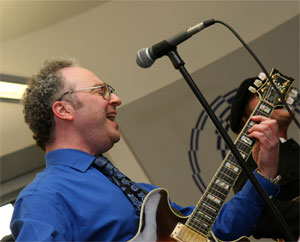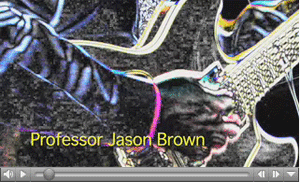 |
| Jason Brown at the book launch for his book, Our Days are Numbered, earlier this month. (Nick Pearce Photo) |
HeвҖҷs at it again. After setting the world on fire with his groundbreaking research that deconstructed the opening chord to The BeatlesвҖҷ A Hard Days Night, Jason Brown is now out to apply mathematical principles to determine what makes the bluesвҖҰwell, the blues.
In the May edition of the Canadian Mathematical SocietyвҖҷs journal, CMS Notes, the В鶹ҙ«ГҪ math professor has published an article вҖ“ вҖңDeducing the BluesвҖқ вҖ“ that seeks to analyze the blues progression, said to be the вҖңmost famous chord progression in modern music.вҖқ
The significance of this progression is singularly important to the genesis of rock 'n' roll. Dr. Brown cites numerous classic rock songs that owe their structure and their universal appeal to this progression вҖ“ Johnny B. Goode, Hound Dog, Rock Around the Clock, Long Tall Sally, Kansas City andВ hundreds more we all know and love вҖ“ and looks at a common blues chord progression that links them all together. He suggests the harmonic sequence is вҖңperfectвҖқ and compares the experience of listening to the progression to a roller coaster.
вҖңThe blues chord progression has been used in other genres, such as country music and jazz, perhaps indeed precisely for the thrill it can add to the harmonic underpinning of the songs,вҖқ he notes. вҖңThe research points towards how you might have the pace of any given chord progression ebb and flow to create and release tension along the harmonic path.вҖқ
Dr. BrownвҖҷs вҖңroller coasterвҖқ concept uses the notion of the excitement one might feel on the amusement park ride: up and down, peak to valley and to peak again. The experience is one of tension and release. He applies the same idea to music, constructing a model that uses twelve bars following a sequence that assigns the most вҖңexcitingвҖқ chords to key places in the sequence, with the biggest вҖңclimbвҖқ at the beginning of the end of the song.
So why the blues? CouldnвҖҷt we apply the same formula to other kinds of music? As it turns out, the blues lends itself to this kind of mathematical modeling in a way other musical genres do not. вҖңCountry music has no one fixed chord sequence that permeates its tunes, and jazz has even a greater variety of chord progressions for its songs,вҖқ Dr. Brown points out. вҖңIt is the fixation of blues on essentially one famous chord progression that makes it amenable to mathematical study.вҖқ
And what would he say to those who might question the notion of trying to demystify a genre of music that perhaps should remain somewhat mysterious, something that should be more about the heart than the head? вҖңThe heart and brain are not independent вҖ” deep emotions can be stirred by the beauty inherent in the underlying mathematics,вҖқ he suggests. вҖңWhile there are undoubtedly some great blues solos that defy explanation, mathematical principles can explain why we are so moved by bluesВ вҖ” why it is indeed so external, so right.вҖқ
So whatвҖҷs the next great musical mystery Dr. Brown will take on? Finally deciphering exactly what the heck the KingsmenвҖҷs Louie Louie is actually about? Establishing the definitive link between the main riff to The KinksвҖҷ You Really Got Me and modern-day heavy metal? Figuring out the exact point at which Britney SpearsвҖҷ actual voice gives way to the computerized AutoTune program? HeвҖҷs not ready to be specific but the musical/math collective journey continues.
вҖңI continue to seek a further understanding of the process of writing music, and the connections between mathematics and the aesthetics of music,вҖқ he says. вҖңThe border where the creative, emotional and analytical aspects of great songs meet is one that I want to continue to explore.вҖқ
LINK: CMS Notes: (Go to page 13 for Jason Brown's article, "Deducing the Blues"
LINK: Jason Brown's theories on math and music are featured on . Hit "video" and look for clips (clip 4) andВ (clip 5).

